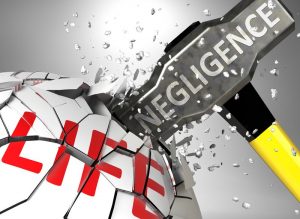The North Carolina General Assembly recently passed legislation that will limit, if not entirely  eliminate Coronavirus lawsuits in North Carolina alleging negligence and malpractice.
eliminate Coronavirus lawsuits in North Carolina alleging negligence and malpractice.
The stated purpose of the law is to “limit civil liability.”
Health care providers, emergency response businesses, and other essential business operations are granted immunity from negligence claims relating to the transmission of the Coronavirus.
What is “Negligence” in North Carolina?
North Carolina “negligence” lawsuits involve a duty of care, failure to comply with that duty, known as a “breach of duty,” and an injury or loss due to that failure to exercise ordinary, reasonable care.
For example, if a motorist fails to follow the law and crashes into another vehicle, permanently disabling passengers, they are deemed “negligent” and therefore legally responsible (liable) for their acts.
North Carolina Coronavirus Laws
Nursing homes, group homes, medical centers, hospitals, and other businesses that have failed to take reasonable precautions to protect against transmission of the Coronavirus are not subject to ordinary negligence claims and the associated legal liability.
As such, immunity is now provided except in instances of gross negligence, intentional wrongdoing, and/or criminal acts.
Immunity for Healthcare Providers in North Carolina
The stated purpose of the “Act” (the Emergency or Disaster Treatment Protection Act) is to promote/encourage safety and public health.
The law, in fact, exempts health care providers and facilities from legal liability.
Exemption from responsibility is not limited only to patients with Coronavirus symptoms or diagnosed cases of COVID-19.
The Act grants immunity for any civil liability to health care providers, health care facilities, and businesses responsible for those health care providers or facilities, for negligence, negligent acts, and omissions when:
- The negligent provision of services is required to have occurred during the period of the COVID-19 emergency declaration; and,
- The provision of health care treatment(s) and services are related to the Coronavirus pandemic; and,
- The provision of health care services provided was done so in “good faith.”
Reckless misconduct, gross negligence, and intentional infliction of harm (criminal acts) are not immune from civil liability.
Acts and omissions associated with improper staffing and shortages in resources are specifically excluded as gross negligence, intentional infliction of harm, and reckless misconduct.
Immunity is further extended to volunteer organizations that volunteered to assist in the State’s response to the Coronavirus. Again, reckless misconduct, gross negligence, and intentional infliction of harm remain subject to legal liability.
As such, those covered under the Act, are not responsible for death to an individual, death, and damages that result from nonphysical and physical contact. Immunity applies to non-economic damages and economic losses alike for harm committed on an individual.
What does the Act cover?
- Substantial civil immunity from acts of negligence and omissions related to the treatment and care of others for and during the Coronavirus
- The Act will prevent most lawsuits for negligence and medical malpractice, nursing malpractice, and nursing home negligence
- The Act does not prevent lawsuits when there exists an elevated or “heightened” standard of care or the allegations include intentional misconduct, gross negligence, or criminal acts
Essential Business Liability in North Carolina
The new law provides legal immunity for essential businesses that provide goods or services in North Carolina.
Again, the Act does not apply if the alleged negligence, negligent acts, or omissions amount to reckless misconduct, gross negligence, intentional infliction of harm, or criminal acts.
Essential businesses are provided immunity from legal liability for death or injuries caused by an employee or customer contracting COVID-19 while employed by the essential business or while doing business with an essential business.
Essential businesses are defined by Executive Order 121 of the Governor and the NC Department of Revenue, applying to thing like:
- Churches
- Religious Facilities
- Social Services Organizations
- Grocery Stores
- Financial Institutions
- Pharmacies
- Health Care Providers
- Critical Supply Chain Distributors
- Critical Supply Chain Manufacturers
Is the NC Workers’ Compensation Act Included?
No, the new law does not preclude employees seeking Work Comp due to death, dismemberment, or personal injury related to contracting COVID-19 while employed by an emergency response entity or essential business.
Can I get Workers Compensation for the Coronavirus?
If you are a healthcare worker, emergency responder, or employee of an Essential Business and have questions about making a claim under the NC Workers’ Compensation Act, please call Kevin Jones now: 252-639-1787
North Carolina Personal Injury Lawyers
If you have been injured in a workplace accident or due to the negligence of another in a car accident, the Dodge Jones Injury Law firm is available for legal consultations.
Our law firm does not charge consultation fees.
Legal fees are contingent upon successful recovery or settlement. We do not charge hourly rates. We also do not represent corporations, insurance companies, or those who cause injuries or the loss of life to others.
Call NOW to schedule your free consultation.
 North Carolina Workers' Compensation News
North Carolina Workers' Compensation News








